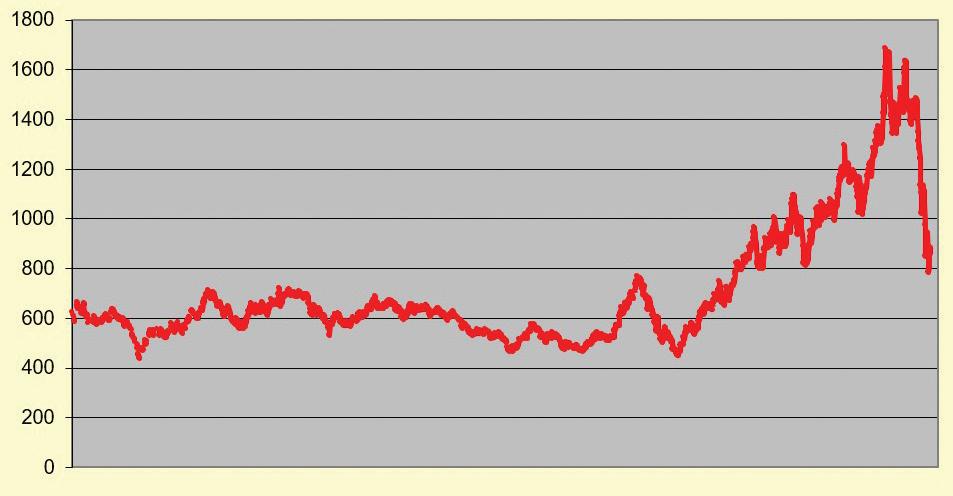
4 minute read
Large harvest puts strain on
IN BRIEF
USA: US agribusiness co-operative CHS announced on 14 June that it will be building a new grain storage facility in Erskine, Minnesota, due to become operational in 2023.
The facility would provide 1.25M bushels of additional storage capacity and expand the plant’s total storage capacity to 4.55M bushels.
“This facility is a key location in the flow of grain from the Upper Midwest to export terminals in the Pacific Northwest,” Rick Dusek, executive vice president of CHS ag retail operations, said.
UKRAINE: The port of Mykolaiv was hit by a second missile attack on 22 June, with at least two grain and vegetable oil terminals hit by missiles, AgriCensus reported local sources as saying on the day.
Viterra – which is partowned by commodities giant Glencore – said that its Everi vegetable oil terminal had been on fire but there were no casualties. The Greentour grain terminal, owned by Bunge, was also affected in the attack.
Bunge said no employees were injured as the plant had been closed since 24 February, the date Russia invaded Ukraine.
Mykolaiv was Ukraine’s second largest port in terms of grain and oilseeds exports, accounting for around 28% of all grains, oilseeds and meals exported from 1 July to 22 February.
Large harvest puts strain on Mato Grosso storage
The Brazilian state of Mato Grosso is facing storage issues in the face of projected increases in soyabean and corn output, AgriCensus reported market sources as saying.
With a total storage capacity of approximately 39M tonnes, the state – Brazil’s largest grains and oilseeds producer – did not have sufficient capacity to accommodate this year’s soyabean and corn output, which was expected to be double last year’s volumes, the 30 June report said.
Producers had delayed soyabean sales since the start of the marketing year in the hope of getting better prices, AgriCensus wrote, and this had increased the challenge to accommodate the 39M tonnes of corn expected to be harvested this season, heightened recently with the second corn crop harvest progressing at a fast pace.
Against an uncertain backdrop in the soyabean market, Brazilian producers from Mato Grosso had around 8.5M tonnes of soyabeans remaining to trade – taking into account only the volume still with producers – according to data from the state’s agriculture institute IMEA.
A total of 78% of the soyabean crop, estimated at 40.5M tonnes, had been sold, compared to 88.2% at the same point the previous year, IMEA data published in June showed.
According to Brazil’s soyabean producers’ association Aprosoja, Mato Grosso needs to expand its static capacity to 125M tonnes until 2030 to keep up with the increase in production.
Trucker protest blocks Argentine exports
Trucks loaded with grain were blocked from getting to Argentina’s largest port on 29 June due to a truck driver protest against high diesel prices and fuel shortages, Reuters reported that day.
Truck owner organisations blocked loaded trucks on different roads in Sante Fe, home to port city Rosario, the gateway for around 80% of Argentine agricultural exports, according to the local Road Safety Agency.
Argentina is the world’s top exporter of processed soyabean oil and meal, the second largest exporter of corn, and a major global supplier of wheat and beef, the report said.
Rosario terminals on the Paraná River received 889 grain trucks, 76% less than
More than 80% of Argentine grain for export is transported by trucks
the previous year, the Rosario Grains Exchange said.
“As of (29 June), we are missing more than 400,000 tonnes (of merchandise), so we are close to running out of grains,” Gustavo Idigoras, the head of the grain exporters and crushers chamber in Buenos Aires, told Reuters.
The country’s transport minister Alexis Guerrera said that the diesel shortage should be resolved within 15 to 20 days with the arrival of ships carrying fuel imports.
FAO announces $17M storage and logistics project for Ukraine
The Food and Agriculture Organization of the United Nations (FAO) announced a new US$17M project to help Ukrainian farmers save their upcoming harvest while ensuring exports of critical agricultural goods to international markets on 5 July.
Funded by Japan and implemented jointly with Ukraine’s Ministry of Agrarian Policy and Food, the project aims to restore grain storage capacity and supply chain functionality from harvest to export, the FAO said.
Ukraine exports more than 45M tonnes/ year of grain and has 18M tonnes of last year’s cereals and oilseeds in storage waiting for export, according to the ministry.
The country was expecting to harvest up to 60M tonnes of grain this season but 30% of available storage space for the new harvest was filled with last season’s crop, the FAO added.
The new project would address storage issues by providing polyethylene grain sleeves, grain loading and unloading machinery to smallholders and a range of modular storage containers to medium-sized producers in 10 regions in the east, centre, south and north of Ukraine.










